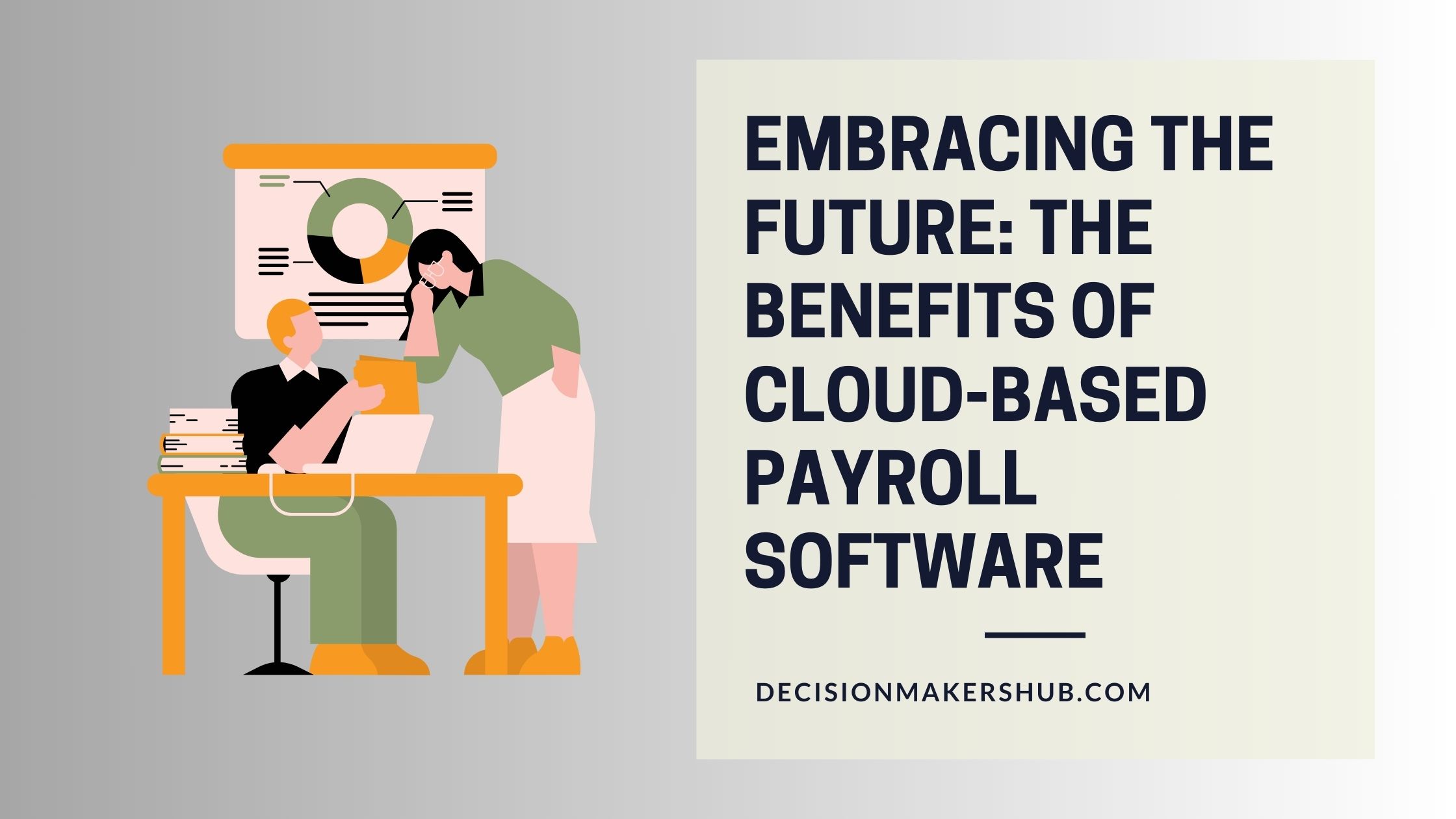In the dynamic landscape of business operations, staying ahead often involves embracing innovative solutions. One such transformative shift is the move from traditional on-premise payroll software to the efficiency and flexibility offered by cloud-based payroll solutions. As more companies make this transition, it’s essential to understand the advantages that cloud payroll software brings to the table. In this comprehensive exploration, we will delve into the intricacies of cloud-based payroll systems and outline the compelling reasons why your organization should consider making the switch.
Understanding Cloud Payroll Software
Before we embark on the journey of exploring its benefits, let’s establish a clear understanding of what cloud payroll software entails. In essence, cloud-based payroll software operates through a remote system, commonly known as the cloud. This allows users to access, manage, and process payroll tasks from any electronic device connected to the internet. The significance of this shift becomes evident when we examine the numerous advantages it offers to both employers and employees.
**1. Speed and Accuracy Enhancement
One of the foremost priorities for any organization is ensuring that employees are paid accurately and promptly. Cloud-based payroll software addresses the common challenges faced by HR and payroll departments during the payroll process. With user-friendly interfaces and streamlined navigation, these systems are designed to alleviate the pressure associated with running payroll. Automation plays a pivotal role, eliminating the need for manual calculations and minimizing errors, redundancies, and workarounds that often plague traditional on-premise payroll software.
2. Online Payroll Solutions for Modern Work Environments
The nature of work has evolved, and businesses are increasingly operating beyond the confines of traditional office spaces. Cloud-based payroll services provide the flexibility for HR staff and managers to process and approve payroll from any device, at any time. This becomes especially advantageous for businesses with multiple worksites spanning different time zones. Field managers can seamlessly review and approve time cards, respond to leave requests, and manage payroll tasks directly from their smartphones or tablets.
3. Robust Data Security Measures
Concerns about the security of cloud-based payroll software often arise, but in reality, data stored in the cloud is generally more secure than its on-premise counterpart. On-premise servers are vulnerable to natural disasters, fires, and technology outages. In contrast, cloud-based payroll service providers invest significantly in data and infrastructure security. The data is encrypted and rigorously backed up, ensuring a high level of protection against potential threats.
Key security considerations when evaluating a provider’s practices include:
- Hosting data on a private cloud.
- High server uptime guarantees.
- Utilization of top-tier certified data centers with 24/7 security monitoring.
- Encryption of information using secure protocols.
4. Scalability Tailored to Business Needs
Unlike on-premise payroll software, cloud-based systems are inherently scalable. This scalability is particularly advantageous for companies managing a fluctuating or growing workforce. With cloud payroll software, organizations need not worry about outgrowing capacity or overpaying for services. The pay-as-you-go model ensures that companies pay only for the capacity they utilize during a specific billing period, making it a cost-effective solution.
5. Employee Self-Service Empowerment
The introduction of employee self-service portals is a significant enhancement offered by cloud-based payroll software. These portals empower employees with anywhere, anytime access to their HR and payroll information. Through personal mobile devices, employees can review pay history, access benefits information, request time off, and update their contact details. This not only fosters employee empowerment but also alleviates the burden on managers and HR staff, who would otherwise handle these requests manually.
6. Cost Reduction and Efficient Updates
Cloud-based payroll solutions provide a higher return on investment compared to traditional on-premise software. The absence of in-house servers to purchase and maintain, coupled with the elimination of physical setup and upgrade costs, results in significant savings. Updates are seamlessly managed by Software as a Service (SaaS) providers, minimizing downtime and allowing in-house IT teams to focus on other priorities. Payroll staff benefits from processing payroll in the cloud with the latest software versions.
7. Environmentally Friendly Practices
Reducing the environmental impact is a growing concern for many businesses. Cloud-based payroll software contributes to environmental sustainability by reducing energy consumption. With fewer servers to maintain, companies decrease their carbon footprint. Additionally, the pay-as-you-go model ensures that cloud storage is utilized efficiently, minimizing waste and promoting eco-friendly practices.
8. Ensuring Tax Compliance with Ease
Navigating the complexities of tax compliance is a common challenge for businesses. Cloud-based payroll software often includes features that ensure adherence to local, state, and federal tax regulations. Some systems even provide notifications about changes or updates to laws and regulations that may impact the business. Simplifying the tax compliance process, cloud payroll software offers peace of mind to business owners by keeping them informed and up-to-date.
Conclusion: A Paradigm Shift in Payroll Management
In conclusion, the migration to cloud-based payroll software represents a paradigm shift in how organizations approach payroll management. The benefits outlined above underscore the transformative impact that this technology can have on the efficiency, flexibility, and sustainability of payroll processes. As businesses continue to evolve, embracing cloud-based solutions becomes not only a strategic choice but a necessity for staying competitive in a dynamic marketplace. The future of payroll management is undoubtedly in the cloud, and organizations that seize this opportunity are poised to reap the rewards of enhanced speed, accuracy, and overall operational excellence.

Darren Trumbler is a versatile content writer specializing in B2B technology, marketing strategies, and wellness. With a knack for breaking down complex topics into engaging, easy-to-understand narratives, Darren helps businesses communicate effectively with their audiences.
Over the years, Darren has crafted high-impact content for diverse industries, from tech startups to established enterprises, focusing on thought leadership articles, blog posts, and marketing collateral that drive results. Beyond his professional expertise, he is passionate about wellness and enjoys writing about strategies for achieving balance in work and life.
When he’s not creating compelling content, Darren can be found exploring the latest tech innovations, reading up on marketing trends, or advocating for a healthier lifestyle.
